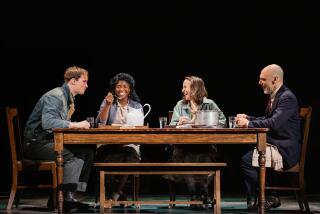A Twisting, Frightening Trip Through Rouse’s ‘Kansas’
- Share via
Although Kansas and the surrounding Midwestern states have added a prized flat twang to American popular music, it is a musical accent America’s more art-minded composers from the Midwest have typically worked hard to lose. And yet, that same sound can make our opera its most authentically American. Virgil Thomson, from Kansas City, Mo., invented a national opera style in Paris, writing cosmopolitan works with Gertrude Stein that were musically plain-spoken and replete with the songs and hymns of the Great Plains. Robert Ashley has invented the newest and hippest form of American television opera that incorporates the stories and spoken language of the Midwest.
Mikel Rouse’s haunting opera “Failing Kansas,” based upon Truman Capote’s “In Cold Blood,” is a further step in this arresting tradition of Midwestern opera. Like Thomson, Rouse is from Missouri and has become a sophisticated New York composer who has never lost his musical roots. His earlier opera “Dennis Cleveland,” which merges high art with television talk show theatrics, made a powerful impression when produced last season as part of the Eclectic Orange Festival at the Orange County Performing Arts Center. “Failing Kansas,” performed in the Center’s Founder’s Hall over the weekend, follows “Dennis Cleveland” as the second part of a projected trilogy.
“Failing Kansas” is modest theater. It consists of nine songs with music and lyrics by Rouse and wonderfully sung by him. The accompaniment is electronic, all of it realized by the composer in his studio. The only foreign element is a background black-and-white film by Cliff Baldwin, which is cut to the music but contains images only tangentially related to the texts. Rouse, in a dark suit, alternates between the four corners of the bare stage and sings.
*
And, yet, genuine opera this is--and an exceptionally powerful example of the form. Opera is the distillation of drama, and its value is in its ability to capture the atmosphere of a time and place and the inner feelings of characters in a way no other art form can. Rouse does just that in “Failing Kansas.” Mesmerized by Capote’s celebrated novelistic retelling of the coldblooded murder of the righteous Clutter family in Holcomb, Kan., in 1959, Rouse seems to enter into the world and mind of the killers in this 75-minute musical monologue.
Actually, monologue is not quite right. “Failing Kansas” contains many voices, all heard within a single one. Rouse overlays himself on the taped tracks, and they fracture into a counterpoint that he has called counterpoetry. Indeed, what makes Rouse’s music so fascinating is that it completely merges speech and song into a rich overlay of textures. The songs have a lush pop music texture (some have noticed a seeming Rouse influence on Beck). The melodies are immediate but complexly structured like poetry; his beautiful lyrics are highly musical in tone and rhythm. There is always a bite to Rouse’s music in its layered richness, but there is also a melodic sweetness that comes from the subtle absorption of hymn tune into the texture. It ends with a song so unforgettably effusive that one could almost imagine it given a schlocky arrangement and turned into a hit for Andrea Bocelli.
And yet all of this stylistic variety is aimed at a very private and troubling vision. Rouse does not retell “In Cold Blood,” (that’s been done often enough, including at the movies); he instead mulls over it, imagines what the killers feel, tries to understand them. It is a frightening experience to enter into such minds, and the genius of “Failing Kansas” is to break down our defenses through its deceptively flat, cool, understated Midwestern tone. The film helps, too, by its lack of specificity. Images of travel (cars, trains and planes) and images of people and relationships give a kind of real quality to everything without tying the imagination down to specific characters or journeys. We understand the killers’ quest for mythic expression lost in an everyday world.
Glittery, starry new American operas, such as Jake Heggie’s recent “Dead Man Walking,” tell stories we already know and tug at heartstrings well prepared for tugging. “Failing Kansas” doesn’t tug. It makes us think and try to feel as we never have felt. And it does so with music as memorable as the best pop, but better made. This is a profound and considerable achievement.
More to Read
The biggest entertainment stories
Get our big stories about Hollywood, film, television, music, arts, culture and more right in your inbox as soon as they publish.
You may occasionally receive promotional content from the Los Angeles Times.











